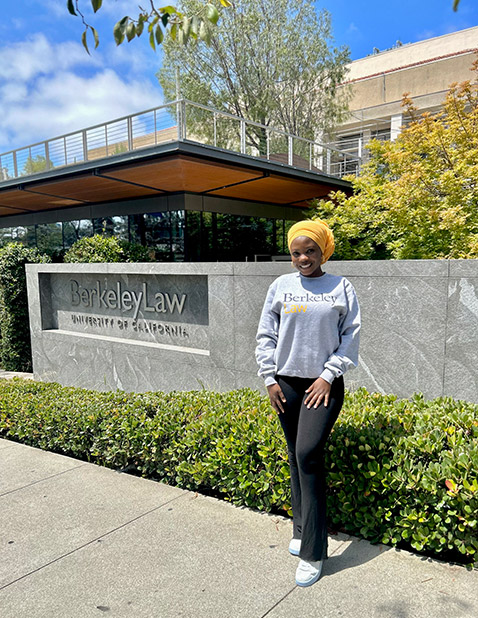Great Story…
But clearing obstacles is nothing new for Atata, who grew up in Nigeria fascinated by technology and relentlessly asking questions of her sister, a software designer.
“When I finished law school, I was eager to explore a less saturated and rapidly evolving field, and tech law became the perfect path for me,” she says.
Eager to demystify the intersection of law and technology, she created D’TechLawGuide in 2021. The first nonprofit of its kind in Nigeria addresses legal challenges African tech startups face and advances tech law education — offering pro bono legal services to early-stage tech startups and supporting them in data protection compliance, intellectual property (IP) issues, and investment strategy.

Atata received Berkeley Law’s African Legal Impact Scholarship, given to just two African students annually, broadening her toolkit through the school’s LL.M. program.
“What drew me to Berkeley Law was the specialization offered in law and technology,” she says. “I was able to fulfill my dream of gaining a world-class education in that area at a renowned institution. The most meaningful part of my time there was the incredible teaching from the professors, who are true scholars in their fields. Although the program was quite intense, they made it both engaging and enriching.”
Atata maintains strong connections with many classmates, and even enlisted one of them (Mariana Zonari from Brazil) to speak in a recent webinar she coordinated on legal due diligence and fundraising strategies for tech startups.
Expanding access and opportunity
In launching D’TechLawGuide, Atata wanted simply to raise awareness about tech law among attorneys and law students. But soon after, she began receiving messages from startup founders — many facing daunting legal challenges due to the complexity of regulatory frameworks and high cost of legal services.
“This inspired me to bridge the gap by offering free legal advisory services to tech startups,” she says. “Given the rapid growth of Nigeria’s tech industry, my deep interest and experience in tech law fueled a strong desire to contribute to the sector’s development.”

Her 10-person team at D’TechLawGuide illuminates issues such as compliance with data privacy laws, IP protection, regulatory approvals, and venture capital law through workshops, webinars, and courses. By next year, Atata hopes to bring on board professionals from different countries and start providing legal assistance to tech startups on a global scale.
She recently presented a three-day Technology Law Workshop on Zoom, drawing over 100 participants for a comprehensive look at key tech law areas.
“The workshop was one size fits all, that one medicine you take to treat all your ailments,” says Chioma Eme, a law firm associate and data protection officer in Nigeria. “I’m positive I speak for every attendee when I say it was the most in-depth, educative, and insightful workshop I’ve ever had the opportunity of attending. It allowed me to go beyond my corporate commercial practice and into broader topics, piqued my interest in finance and startup law, and expanded my knowledge of the gray areas I came across.
“This is quite a novel area of law in Nigeria, majorly governed by industry standards. However, this workshop opened my eyes to the fact that Nigeria has to put in a lot of work to catch up with the rest of the world. I’m now well-informed and better positioned to make a significant contribution to the growth and development of technology law in Nigeria … I’m also a huge fan of Bashirat, and for every other workshop she announces she’s got me on lock.”
Cover to cover
Atata is close to publishing her first e-book, What You Need to Know About Technology Law, a thorough guide for law students and lawyers in Nigeria. With the absence of a unified tech law framework and information often fragmented, she aims to codify tech law’s major branches into a single, accessible resource for easy reference.
“Reflecting on my own journey into this field, I remember the challenges of sifting through numerous articles and disparate sources of information,” she says. “It was overwhelming, and I thought, ‘Why not create a comprehensive guide that consolidates all the key areas of tech law in one place?’ This e-book aims to serve as a valuable reference for beginners and aspiring professionals alike.”
Atata says the main challenges facing African startups are access to capital, access to infrastructure, and regulatory compliance. Without sufficient funding, she sees many companies shutting down after just a few years. Inadequate electricity and the high cost of internet access also hinder startup growth in Africa, with frequent power outages and unreliable WiFi disrupting operations and limiting the ability to fully leverage digital tools and platforms.
“These deficiencies not only increase operational costs but also impede consistent production and service delivery, making it difficult for startups to scale and compete effectively,” Atata says.
As for regulatory compliance, Africa lacks a unified data privacy protection law like the European Union’s General Data Protection Regulation. As a result, Atata notes, startups with subsidiaries in African countries face challenges working through thorny regulatory requirements, especially when it comes to cross-border data transfers. This lack of uniformity makes it hard to track and comply with all the regulatory demands across different jurisdictions.
“Currently, Africa is home to seven unicorn tech companies, four of which are Nigerian,” she says. “Recognizing the immense potential of this industry, I’m committed to supporting its economic growth by helping startups navigate legal complexities.”





